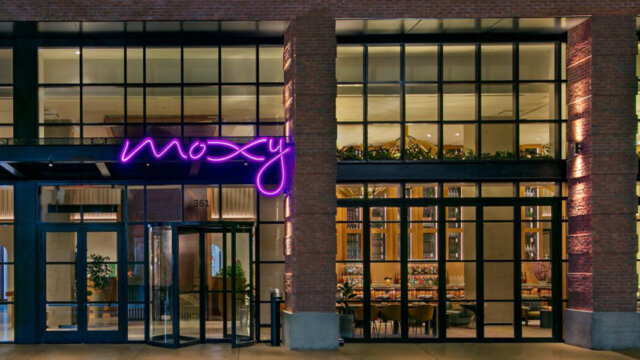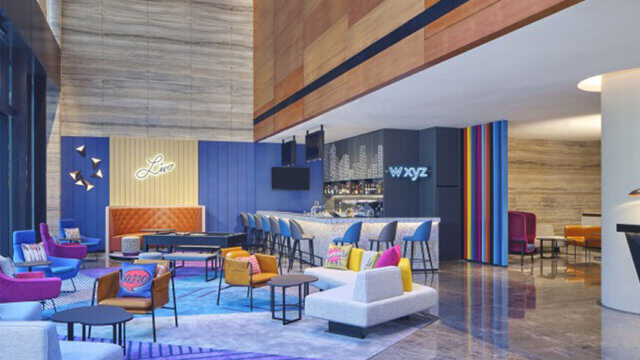Marriott International Inc., for the fourth quarter of 2021, reported net income of $468 million, following a net loss of $164 million in the same period a year ago. Comparable systemwide constant dollar RevPAR increased 124.5% worldwide year-over-year (143.6% in the U.S. and Canada, and 83.3% in international markets).
“The 2021 fourth quarter capped off a year that showed the incredible resilience of people’s desire to travel and the appeal of our broad portfolio of 30 global brands,” said CEO Anthony Capuano. “We experienced significant progress in global RevPAR recovery in 2021 despite the emergence of new variants and ongoing headwinds from the global pandemic. By the fourth quarter, global RevPAR was 19% below 2019 levels, a 40-percentage-point improvement from the decline in the first quarter of the year. Global average daily rate (ADR) nearly recovered to pre-pandemic levels in the 2021 fourth quarter, while occupancy came in at 58%, down 12%age points versus 2019. Leisure demand continued to shine in the fourth quarter, with slower, yet continued improvement in business transient and group demand.”
Key Q4 highlights:
- Fourth-quarter 2021 comparable systemwide constant dollar RevPAR declined 19.0% worldwide, 15.3% in the U.S. & Canada, and 28.2% in international markets, compared to the 2019 fourth quarter.
- Fourth-quarter reported diluted EPS totaled $1.42, compared to reported diluted loss per share of $0.50 in the year-ago quarter. Fourth-quarter adjusted diluted EPS totaled $1.30, compared to fourth-quarter 2020 adjusted diluted EPS of $0.12.
- Fourth-quarter adjusted net income totaled $430 million, compared to fourth-quarter 2020 adjusted net income of $39 million.
- Adjusted EBITDA totaled $741 million in the 2021 fourth quarter, compared to fourth-quarter 2020 adjusted EBITDA of $317 million.
- The company added more than 86,000 rooms globally during 2021, including approximately 43,000 rooms in international markets and more than 18,000 conversion rooms. Net rooms grew 3.9% from year-end 2020.
- At year-end, Marriott’s worldwide development pipeline totaled 2,831 properties and roughly 485,000 rooms, including approximately 19,000 rooms approved, but not yet subject to signed contracts. More than 202,000 rooms in the pipeline were under construction as of the end of 2021.
“Each of our regions saw meaningful continued RevPAR recovery in the fourth quarter compared to the third quarter, with the exception of Greater China, where recovery stalled due to their zero COVID policy,” said Capuano. “In the U.S. & Canada, RevPAR declined 15% compared to fourth quarter 2019 levels versus a 20% decline in the third quarter compared to 2019. Compared to 2019 levels, our international hotels posted a 28% RevPAR decline in the fourth quarter, a 12-percentage point improvement from the third quarter. While Omicron caused a temporary setback in global demand recovery in January, especially for business transient and group travel, new bookings across customer segments have rebounded to pre-Omicron levels. We are optimistic that the global recovery will progress meaningfully throughout 2022.”
He continued, “While we are keeping an eye on the continued impact from Omicron, we look forward to the day when we reach a new normal where the impact from COVID-19 on travel has essentially disappeared. In the meantime, we continue to focus on driving revenues, controlling costs, maximizing cash flow, and improving our credit metrics. Assuming no meaningful setback in the global recovery, we could begin returning cash to shareholders later in 2022.”
Fourth-Quarter 2021 results
Marriott’s reported operating income totaled $635 million in the 2021 fourth quarter, compared to a reported operating loss of $128 million in the year-ago quarter.
Adjusted operating income in Q4 totaled $578 million, compared to $148 million in the same period a year ago. Adjusted operating income in the 2020 fourth quarter excluded impairment charges of $44 million.
Base management and franchise fees totaled $737 million in the quarter, compared to base management and franchise fees of $379 million in the year-ago quarter. The year-over-year increase in these fees is primarily attributable to RevPAR increases due to the ongoing recovery in lodging demand. Other non-RevPAR related franchise fees in the quarter totaled $186 million, compared to $133 million in the year-ago quarter, aided by higher credit card and residential branding fees.
Incentive management fees totaled $94 million in the 2021 fourth quarter, compared to $44 million in the 2020 fourth quarter. The year-over-year increase was split evenly between the International and U. S. & Canada segments.
Contract investment amortization for the quarter totaled $19 million, compared to $38 million in the year-ago quarter. The year-over-year change largely reflects impairments of investments in management and franchise contracts recorded in the 2020 fourth quarter.
Owned, leased and other revenue, net of direct expenses, totaled a profit of $33 million in the 2021 fourth quarter, compared to a $27 million loss in the year-ago quarter, and reflects the ongoing recovery in lodging demand.
Depreciation, amortization and other expenses for the quarter totaled $54 million, compared to $71 million in the year-ago quarter. Expenses in the 2020 fourth quarter included $22 million of impairment charges.
General, administrative and other expenses for Q4 2021 totaled $213 million, compared to $183 million in the year-ago quarter. The year-over-year increase primarily reflects higher compensation and legal costs.
Performance information
The company added 120 properties (20,440 rooms) to its worldwide lodging portfolio during the 2021 fourth quarter, including more than 3,500 conversion rooms and approximately 10,000 rooms in international markets (including W Rome, shown above). Twenty-three properties (4,955 rooms) exited the system during the quarter. At year-end, Marriott’s global lodging system totaled 7,989 properties with more than 1,479,000 rooms.
At year-end, the company’s worldwide development pipeline totaled 2,831 properties with roughly 485,000 rooms, including 1,008 properties with more than 202,000 rooms under construction and 98 properties with approximately 19,000 rooms approved for development, but not yet subject to signed contracts.
“Our development team had a strong 2021, signing approximately 92,000 rooms, of which more than 50,000 were in international markets and more than 40% were in the upper-upscale and luxury tiers,” said Capuano. “During the year, we added more than 86,000 gross rooms to our distribution, a new annual record, 21% of which were conversions. We were pleased to post 3.9% net rooms growth for 2021, exceeding our previous expectations. With our momentum around conversions and our industry-leading pipeline, we are bullish about our ability to increase our footprint over the next several years. For 2022, we expect gross rooms growth approaching 5% and deletions of 1% to 1.5%, resulting in anticipated net rooms growth of 3.5% to 4%.”
Balance sheet and liquidity
At year-end 2021, Marriott’s net debt was $8.7 billion, representing total debt of $10.1 billion less cash and equivalents of $1.4 billion. At year-end 2020, the company’s net debt was $9.5 billion, representing total debt of $10.4 billion less cash and equivalents of $0.9 billion.
Investment spending
Marriott anticipates that full-year 2022 investment spending will total $600 million to $700 million. Total investment spending includes capital and technology expenditures, loan advances, contract acquisition costs and other investing activities.
“As I finish my first year as CEO, I could not be prouder of how our associates have managed through this crisis,” said Capuano. “They have worked tirelessly to serve our guests, support our owners and franchisees, and assist each other. I am incredibly optimistic about Marriott’s future and look forward to continued recovery in 2022 and the prospects for meaningful growth in the coming years.”


